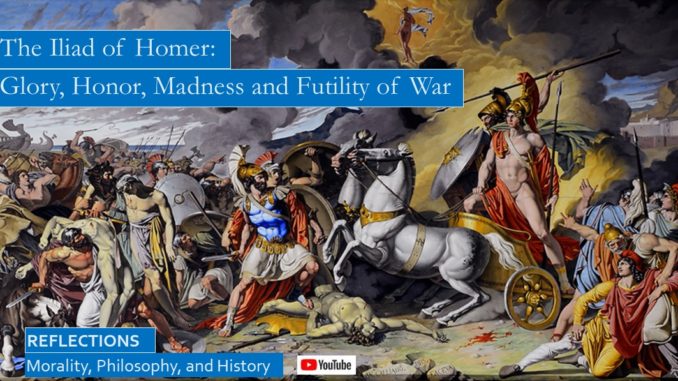
The embassy to Achilles ends with them leaving not a warrior
but simply a bard strumming his lyre alone on the shores of the sea.
The battle lines sway back and forth, Odysseus and Ajax spy a Trojan spy,
and cut him down, then the Trojans in his advance camp.
The battle wages, many warriors fall, many warriors are wounded and healed,
as Professor Vandiver notes, they either or suffer minor injuries,
the heroes of the Iliad never suffer humiliating decapacitating injuries
REFLECTIONS ON THE ILIAD
Iliad Blog 1: Iliad, Blog 1, Why Should a Christian Read the Iliad?
http://www.seekingvirtueandwisdom.com/iliad_blog01/
The Iliad, the Basis of Greek Culture and the Western Philosophical Tradition
https://youtu.be/DpmuhZJUJn0
Iliad Blog 2, Captured Concubines in the Iliad and the Torah
http://www.seekingvirtueandwisdom.com/iliad_blog02/
The Iliad, blog 4, Briseis, Chryseis, Aren’t all Concubines the Same?
http://www.seekingvirtueandwisdom.com/the-iliad-blog-4-briseis-chryseis-arent-all-concubines-the-same/
Concubines in the Iliad, Old Testament, and Christian Tradition
https://youtu.be/bGHHD7XTvr0
Iliad, Blog 3, The Warrior Cultures of the Iliad and the American Indian, Bravely Visiting the Enemy Camp
http://www.seekingvirtueandwisdom.com/iliad-blog-3-visiting-the-enemy-camp-greeks-vs-indians/
https://youtu.be/ynIx-AVI2f8
The Iliad Blog 5, the Tide of Battle Turns Against the Greeks
http://www.seekingvirtueandwisdom.com/the-iliad-blog-5-the-tide-of-battle-turns-against-the-greeks/
The Iliad Blog 6, Embassy to Achilles, Oration, Failed Meeting
http://www.seekingvirtueandwisdom.com/the-iliad-blog-6-embassy-to-achilles-oration-failed-meeting/
This video approximately corresponds to blogs 5 through 7, with some additional material:
The Iliad of Homer: Glory, Honor, Madness, and Futility of War: https://youtu.be/7lI2ZQ50wRc
YouTube script with more book links:
https://www.slideshare.net/BruceStrom1/the-iliad-of-homer-honor-glory-madness-and-futility-of-war
The Trojans fight their way to very walls of the Greek camps,
which was really a fortified fortress with palisades of sturdy timbers,
surrounded by a deep ditch dug to furnish earth for protection.
The mighty “Hector grabbed a boulder, bore it up and on . .
no two men, the best in the whole realm,
could easily prize it up from earth on onto a wagon,
weak as men are now, but he quickly raised and shook it . . .
As a shepherd lifts a ram’s fleece with ease,”
Hector hurls this massive boulder at the gates,
splintering the gates, so the Trojans can storm the walls of the Greek camp.[1]
Trojans and Greeks battle hand to hand, from Book 13 to Book 15,
they battle for the camp, they battle for the ships,
Hector is warned by a seer to fall back, but the seer is ignored.
The goddess Hera, mother of Aphrodite, wife of Zeus,
seeks to distract Zeus, seeks to seduce Zeus, seeks for sleep to overcome Zeus,
so the god Poseidon can shift the tides of battle to the Greek,
as the Greeks battle the Trojans are burning their ships.
With the assistance of Aphrodite, goddess of love, and the goddess sleep,
The Iliad has Zeus babbling, “Let’s lose ourselves in love!
Never has such a lust for goddess or mortal woman
flooded my pounding heart and overwhelmed me so.
Not even then, when I made love to Ixion’s wife
who bore me Pirithous, rival to all the gods in wisdom,
not when I loved Acrisus’s daughter Danae, marvelous ankles,”
and his storming of Europa and Semela and Alcmena queen of Thebes,
and Demeter, queen of the lustrous braids, and Leto ripe for glory,[2]
as Ms. Vandiver wryly notes, Hera must consider herself so fortunate,
Zeus thinks this procession of conquests is meant to impress her.
While Zeus sleeps for five pages of Iliad,
It is the turn of Ajax to pick up and hurl a boulder back at Hector,
stunning him, “the blow sent Hector whirling like a whipping-top,
reeling round and round, as a huge oak goes down,” so falls Hector,
“then back to Troy they bore him, groaning hard.”[3]
Woken, angered, bested, Zeus threatens Hera, who flees.
With Zeus awake, the Trojans once again set fire to the ships of the Greeks.
Patroclus, kind Patroclus, sees “our former champions, all laid up in the ships,
all are hit by arrows or run through by spears.”
Patroclus, distraught, dismayed, tears in his eyes, implores Achilles,
who answers, “Why in tears, Patroclus?
Like a girl, a baby running after her mother,
begging to be picked up, and she tugs her skirts.”
Patroclus pushes back, “You are intractable, Achilles!
Pray such anger never seizes me, such rage you nurse.
Cursed in your own courage! . . . Your heart of iron!”
Patroclus urges Achilles that if he will not don his armor,
The Achilles will “send me into battle, quickly! . . .
Give me your own fine armor to buckle on my back,
so the Trojans may mistake me for you, Achilles,
and hold off from their attack, and Achaea’s fighting sons
will get a second wind, exhausted as they are.”
“So Patroclus pleaded, lost in his own great innocence,
condemned to get for his own death and brutal doom.”
But Achilles warns him to wear his armor
only to drive the Trojan from the Greek camp,
for Achilles know Patroclus is doomed if he storms Troy in his armor,
Achilles has lost his companion Briseis,
and he does not want to lose his close friend Patroclus, kind Patroclus.
“Patroclus armed himself in Achilles’ gleaming bronze” armor,
his massive shield, his sword, his helmet crested with horsehair,
but not his spear, so massive that only Achilles could wield it,
and also borrowed Achilles’ two immortal stallions, Roan Beauty and Dapple,
yoked in the chariot next to the purebred mortal stallion Bold Dancer.
“Achilles prayed, and Zeus in all his wisdom heard those prayers.
One prayer the Father granted, the other he denied:
Patroclus would drive the onslaught off the ships,
that much Zeus granted, true,
but denied him safe and sound return from battle.”
Led by Patroclus, the fresh armies of Achilles’ Myrmidions,
who arrived in Troy in fifty ships, fifty warriors in each ship,
slowly drove the Trojans back to the walls of their city,
Patroclus and Hector, Greeks and Trojans, trading blows,
many skulls split, many warriors run through by spears and swords,
the Trojans even run a spear through the mortal stallion Bold Dancer,
many battles rage over noble corpses.
Three times Patroclus throws himself at the walls of Troy,
his fourth attempt is doomed, Apollo himself strikes him, stuns him,
then Hector waiting and watching then rushing to Patroclus,
“rammed his spear-shaft home,
stabbing deep in the bowels, and the brazen point
went jutting straight out through Patroclus’ back.”
Hector was able to strip and don the armor of Achilles,
“All day long for the men of war the fighting raged”
all day long the Trojans and Greeks fought over the corpse of Patroclus,
“the Trojans hoping to drag Patroclus back to Troy,
where his corpse will glut the dogs and birds of Troy,
Achaeans wanting to drag his body back to the hollow ships,
and round him always the brutal struggled raging.”
“Standing clear of the fray Achilles immortal horses wept
from the time they first sensed their driver’s death,”
“And Zeus pitied them, watching their tears fall,”
Zeus would only give the Trojans glory until the setting of the sun.[4]
At his death, the “warlord Nestor’s son drew near to Achilles,
streaming warm tears, to give the dreaded message,
‘Patroclus has fallen. There are fighting over his corpse.
He’s stripped, naked, Hector with that flashing helmet,
Hector has your arms!’ So the captain reported.
A black cloud of grief came shrouding over Achilles. . .
Achilles suddenly loosed a terrible, wrenching cry
and his noble mother heard him, seated near her father,
the Old Man of the Sea in the salt green depths.”
His mother Thetis and all the ocean nymphs came out of the sea
processing to the wailing Achilles, mourning his friend Patroclus,
but according to Professor Vandiver, mainly mourning his mortality,
mourning that soon Achilles would meet his fate soon after he slays Hector.
Achilles mourns, Achilles grieves, Achilles regrets.
“But Thetis answer, warning through the tears,
‘You’re doomed to a short life, my son, from all you say!
For hard on the heels of Hectors death your death
must come at once.’ ‘Then let me die at once,’
Achilles burst out, despairing, ‘since it was not my fate
to save my dearest comrade from his death! . . .
No, no, here I sit by the ships,
a useless, dead weight on the good green earth,
I, no man my equal among the bronze-armed Achaeans,
not in battle, only in wars of words that others win.
If only strife could die from the lives of gods and men
and anger that drives the sanest man to flare in outrage, . . .
just like the anger Agamemnon king of men has roused with me now. Enough,
Let bygones be bygones. Done is done.
But now I’ll go and meet that murderer head-on,
that Hector who destroyed the dearest life I know.’ “
Many words of the Iliad tell us now to live better lives, how to be better persons, how step up when we should step up, how to live the virtuous life:
If only strife could die from the lives of gods and men
and anger that drives the sanest man to flare in outrage.
Let bygones be bygones. Done is done.
Like a priest told me at confession, our actions are not so important, what is important is rather how we work out the consequences of our actions, how we work out our salvation.
The goddess Iris brings a message to Achilles that he should dally in camp no longer, that he should march out to battle with this fellow Greeks. Achilles reminds her that he has no armor, he cannot fit into the armor donned by any other Greek, her informs the goddess that his mother Thetis has asked the god Hephaestus to forge him a suit of armor befitting the gods, but this armor will not be ready for him to don until the morning light.
“Quick as the wind the goddess had a plan:
‘We know, we too, they hold your famous armor.
Still, just as you are, go out to the broad trench
and show yourself to the Trojans. Struck with fear
at the sight of you, they might hold off the attack.”
One of the most famous scenes of western literature develops,
as Achilles climbed up to the top of the ramparts surrounding the Greek camp,
“the goddess swept a golden cloud to crown his head
and from it she lit a fire to blaze across the field.”
“Achilles rose and loosed an enormous cry
and off in the distance the god Pallas shrieked too
and drove unearthly panic through the Trojans . . .
charioteers were struck dumb when they saw that fire,
relentless, terrible, burst from proud-hearted Achille’s head,
blazing as fiery-eye Athena fueled the flames. Three times
the brilliant Achilles gave his great war cry over the trend,
three times the Trojans and famous allies whirled in panic,
and twelve of their finest fighters died then and there,
crushed by chariots, impaled on their own spears.”
Poets picture the mighty Achilles, larger than life, thundering on the ramparts,
hair ablaze, lighting up the dusk of the seashore as the sun sets in the east.
“And now the exultant Argives seized the chance
to drag Patroclus’ body quickly out of range, and laid him on a litter.” [5]
Agamemnon returns his beautiful Briseis and gives him prizes, but Achilles now only thinks of war, he swears he will not eat or drink or wash until he has avenged the death of Patroclus by killing Hector. Like Uriah the Hittite, he will not sleep in his warm bed until the battle is over.
Professor Vandiver describes the rage of Achilles as being both superhuman and subhuman as he dons his armor and goes into battle. “Achilles is portrayed as if he were already dead. Achilles rejects the human condition.” Before you could not get Achilles off his lyre, now Achilles is a one-man Greek army. Achilles kills relentlessly, Achilles kills showing no mercy, Achilles kills with cruelty, Achilles does all of the killing in the remainder of the Iliad. His killing rage is so consuming the gods have to nourish him with heavenly ambrosia lest he die from exhaustion. He even angers the river goddess by the large number of Trojan corpses he tosses into her waters, and he even has to battle the river goddess.[6]
There is a remarkable scene echoing the Moabite prophet Balaam’s conversation with his donkey, when after Balaam beats his donkey when he stops in the middle of the road, the donkey turns around to inform him there is a heavenly angel barring the way.[7] Achilles chides his immoral horses, “ ‘Don’t leave Achilles
there on the battlefield as you left Patroclus – DEAD!’
. . . The white-armed goddess Hera gave his horse voice:
‘Yes! We will save your life, this time too,
master, mighty Achilles! But the day of death
already hovers near, and we are not to blame
but a great god IS and also the strong force of fate.’ “ . . .
But Achilles is not impressed. “ ‘Why, Roan Beauty, why prophesy my doom?
Don’t waste your breath. I know, well I know,
I am destined to die here, far from father and mother.”[8]
Hector screws up his courage to face Achilles, to face Achilles for one on one combat, but he hesitates, loses his nerve and runs. Achilles chases him around the walls of Troy three times. Hector is shown throughout the Iliad as begin a man of compassion, a man of honor, always doing his duty, but in these last chapters of the Iliad he faces the rage of Achilles, totally without human compassion, and Hector is at a disadvantage. They run past three times the waters where the women of Troy washed their laundry in more peaceful times.
Hector regains his composure, regains his honor, regains his composure, and turns to face Achilles, who runs him down. But even this does not calm the rage of Achilles. He now spends many pages dragging the body of Hector round the walls of Troy, dragging the body of Hector for his wife and children all the people of Troy to see, dragging the body for all the gods of Olympus to witness, and the gods do not like this sight. This is not right. This is not human. The gods rub ambrosia into the body of Hector so it does not decay, so the corpse of Hector is not torn to shreds as it is drug around the walls of Troy.
Now Achilles can eat and drink and wash and enjoy the embraces of Briseis.
But Patroclus feels like he has been neglected,
“Hovering at his head the phantom rose and spoke:
‘Sleeping, Achilles? You’ve forgotten me, my friend.
You never neglected me in life, only now in death.
Bury me, quickly, let me pass through the gates of Hades.’ “
In Greek mythology Hades is not hell but rather where all who are dead drift.
His rage subsiding, Achilles does bury Patroclus, and the Iliad dedicates a chapter to the funeral games of Patroclus, where all Greeks compete in athletic games. Achilles calms down, instead of dragging the body of Hector around the walls of Troy, he now drags the body of Hector around the grave of Patroclus.
Achilles does not truly come to terms with the death of his friend Patroclus until Zeus persuades King Priam to venture alone into camp to claim the body of Hector, a meeting we detailed previously.
The deep empathy Achilles feels for his enemy breaks his rage.
This deep empathy finally helps Achilles accept the death of his friend Patroclus.
“These words stirred within Achilles a deep desire
to grieve for his own father. Taking the old man’s hand
he gently moved him back. And overwhelmed by memory
both men gave way to grief. Priam wept freely
for man-killing Hector, throbbing, crouching
before Achille’s feet as Achilles wept himself,
now for his father, now for Patroclus again,
and their sobbing rose and fell throughout the house.”[9]
The Iliad ends as the Trojans bury Hector within the city of Troy. The Iliad ends with the foreboding of their doom by the Andromache, grieving wife of Hector. The Iliad ends with the poignant eulogy of Helen, over whom this war was fought,
“ ‘Hector, dearest to me of all my husband’s brothers,
my husband, Paris, magnificent as a god,
he was the one who brought me here to Troy,
Oh how I wish I had died before that day!
But this, now, is the twentieth year for me
since I sailed here and forsook my own native land,
yet never once did I hear from you a taunt, an insult.
But if someone else in the royal halls would curse me, . . .
why, you would restrain them with words, Hector,
you would win them to my side,
you with your gentle temper, all your gentle words.”
These are words we should all heed. Far too many supposed Christians feel that it is enough not to lie, that it is enough not to bear false witness, it is not even enough to avoid gossiping, but we should also guard the reputations of our neighbors as if it were our, building a parapet around our roof, calling to mind the prayer of St Ephrem:
Grant me to see my own sins and not to judge my brother.
“And so the Trojans buried Hector, breaker of horses.”[10]
[1] Homer, “The Iliad,” translated by Robert Fagles (New York: Penguin Books, 1990), Book 12, 339-340.
[2] Homer, “The Iliad,” Book 14, pp. 376-380.
[3] Homer, “The Iliad,” Book 14, p. 383.
[4] Homer, “The Iliad,” Books 16-17, pp. 412-466.
[5] Homer, “The Iliad,” Book 18, pp. 468-475.
[6] Elizabeth Vandiver, “The Iliad of Homer,” lectures recorded by The Great Courses, (www.thegreatcourses.com, 1999), lecture 10, quotations are from the study guide.
[7] https://www.biblegateway.com/passage/?search=Numbers+22%3A21-39&version=NIV
[8] Homer, “The Iliad,” Book 19, pp. 501-502.
[9] Homer, “The Iliad,” Book 24, p. 605.
[10] Homer, “The Iliad,” Book 24, pp. 612-614.

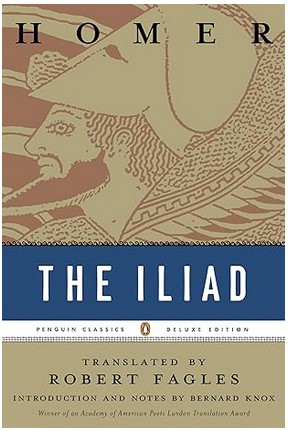



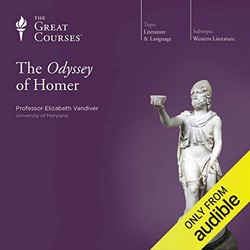
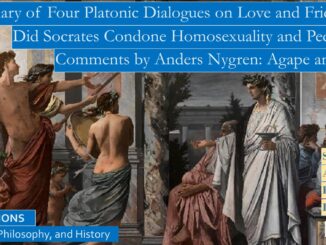
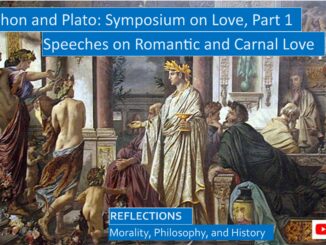
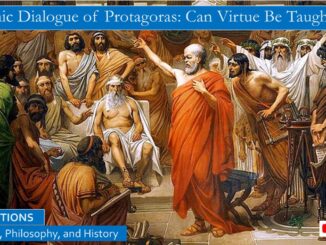
5 Trackbacks / Pingbacks